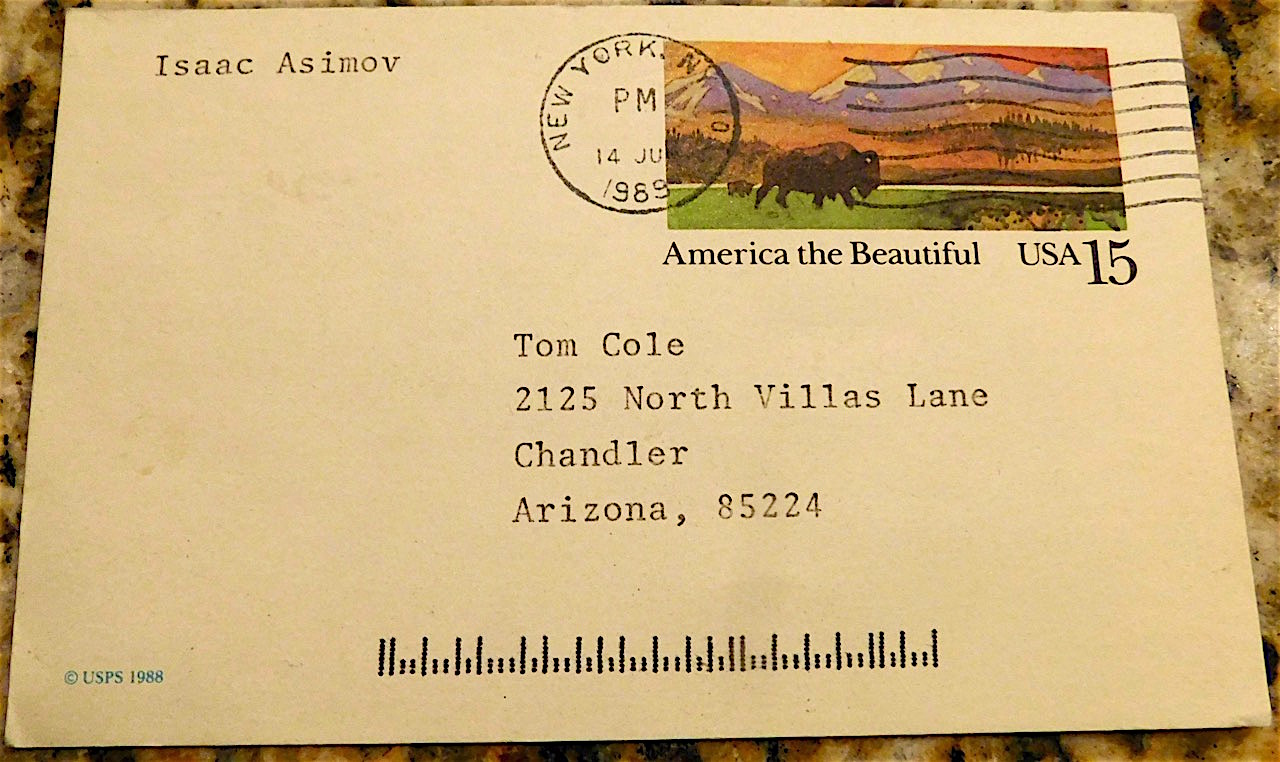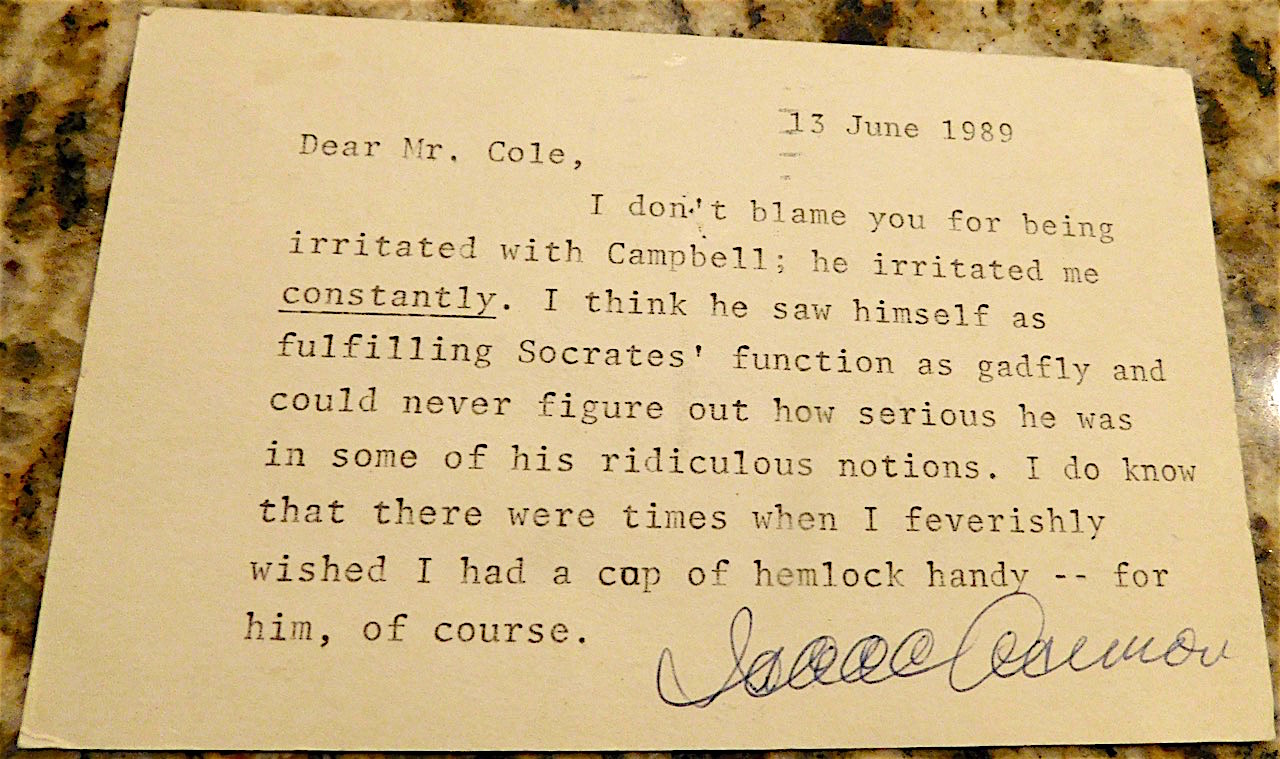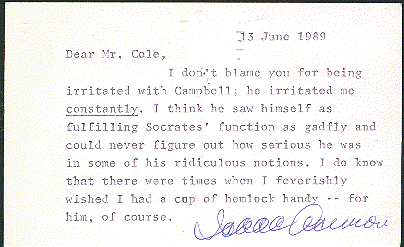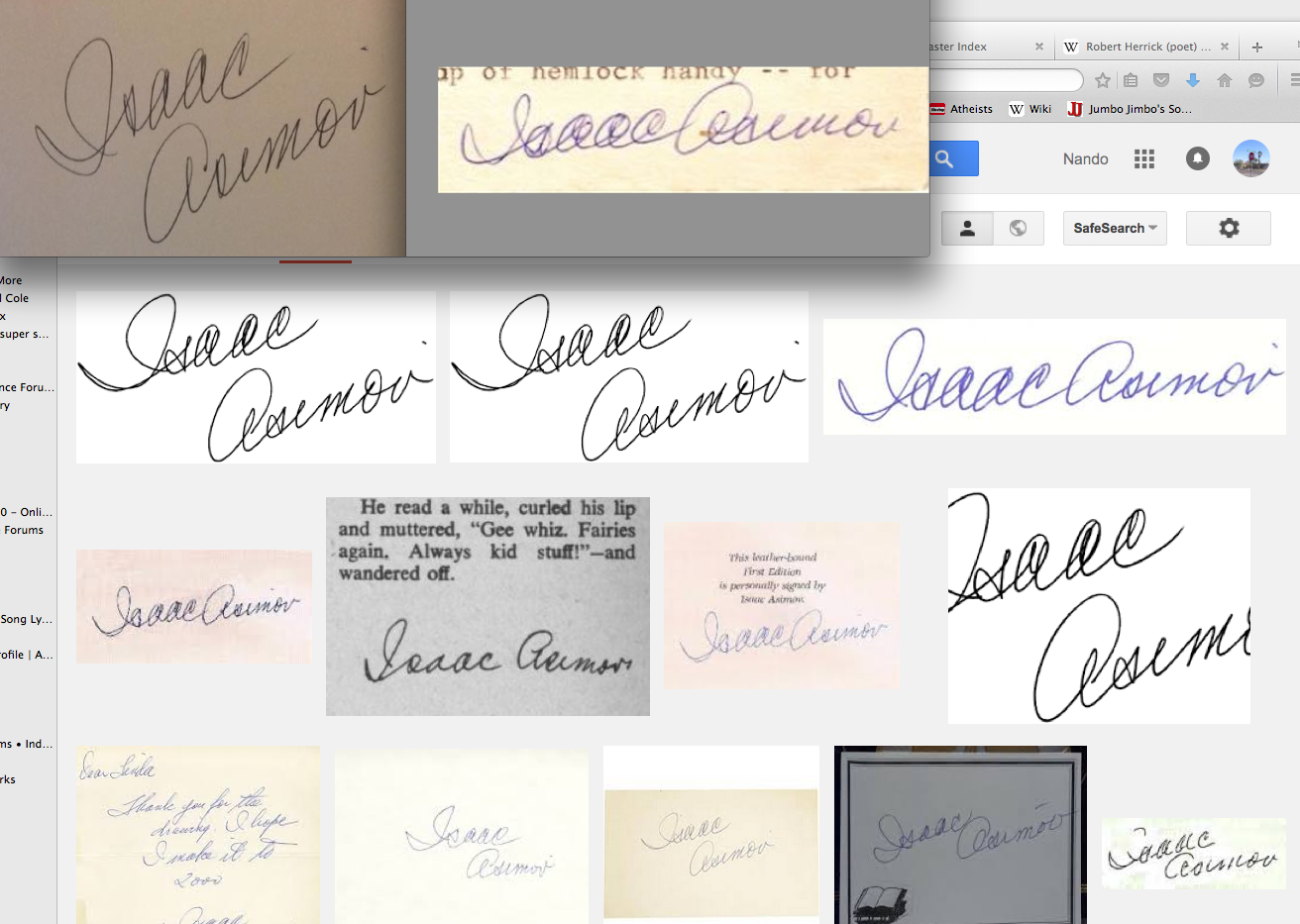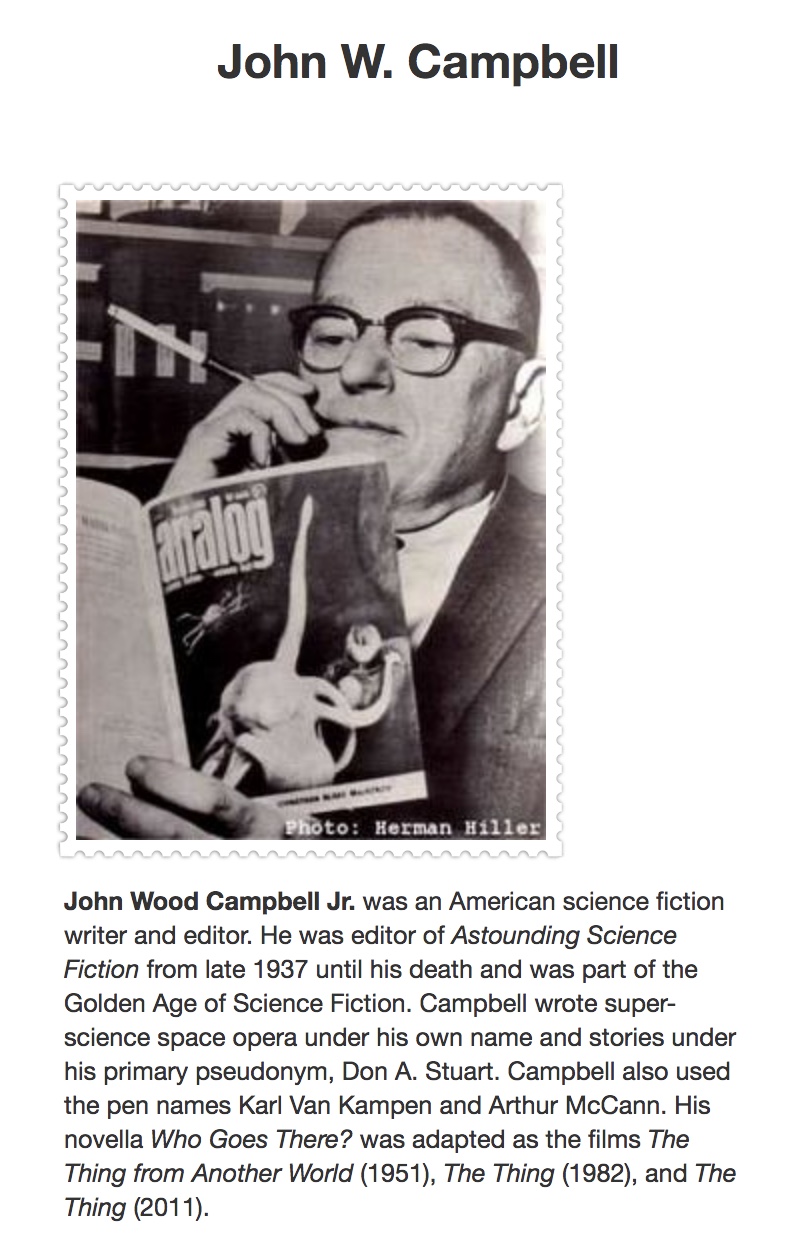15. La
tarjeta postal
Me siento muy orgulloso
de tener en casa una tarjeta postal
escrita por uno de los escritores de
ciencia y ciencia ficción más famosos
del mundo, Isaac Asimov. Él escribió más
de 500 libros y por lo menos una tarjeta
postal (la que escribió y que me envió a
mí).
Cuando yo tenía diecinueve años leí un
editorial por John W. Campbell, un
escritor y editor de una bien conocida
revista de ciencia/ciencia ficción que
se llama Analog. Yo no estaba de acuerdo
con lo que decía y le escribí una carta
en la que le expliqué por qué. Creía que
posiblemente publicaría lo que había
escrito en la sección de cartas en la
revista. Para sorpresa mía, me envió una
carta brusca y enojada de cuatro
páginas. Entonces se murió de un ataque
de corazón a la edad de sesenta y uno.
Mis amigos se burlaban de mí, diciendo
que yo lo había asesinado, pero sabía
muy bien que mi carta no tenía que ver
nada con su muerte; él fumaba como una
chimenea.
De todos modos, pasaron veinte años y me
enteré de que Asimov era un gran amigo
de Campbell y le envié las copias
de la correspondencia. Felizmente,
Asimov estaba de acuerdo conmigo y me
escribió:
13 de junio de 1989
Querido Señor Cole,
No me extraña que Campbell le irritara.
Me irritaba constantemente. Creo que
intentaba desempeñar el papel de
Sócrates como provocador y yo nunca
estaba seguro de que hablara en serio de
sus creencias ridículas. Sé que en
muchas ocasiones locamente quisiera
haber tenido una taza de cicuta a la
mano, para él, por supuesto.
Isaac Asimov
15. The Postcard
I feel very proud to have at home a
postcard written by one of the most
famous writers of science and science
fiction, Isaac Asimov. He wrote over 500
books and at least one postcard—the one
he wrote and sent to me.
When I was nineteen, I read an editorial
by John W. Campbell, a writer and editor
of a well-known science/science fiction
magazine called Analog. I didn't agree
with what he had said and I wrote him a
letter in which I told him why. I
thought that he might possibly publish
what I had written in the letters
section of the magazine. To my surprise,
he sent me a four-page, blunt and angry
letter. Then he died of a heart attack
at the age of sixty-one.
My friends teased me saying that I had
murdered him, but I knew very well that
my letter had nothing to do with his
death; he smoked like a chimney.
At any rate, twenty years passed by and
I learned that Asimov was a great friend
of
Campbell and I sent him copies of the
correspondence. Happily, Asimov agreed
with me and wrote:
13 June 1989
Dear Mr. Cole,
I don’t blame you for being irritated
with Campbell; he irritated me
constantly. I think he saw himself as
fulfilling Socrates’ function as gadfly
and could never figure out how serious
he was in some of his ridiculous
notions. I do know that there were times
when I feverishly wished I had a cup of
hemlock handy -- for him, of
course.
Isaac Asimov
INTRODUCTION
TO MY TENTH BILINGUAL MEMOIR UNNAMED
FOR NOW
Al empezar ésta, mi
décimo autobiografía bilingüe, me dije
que muy probablemente sería la última.
Creía que me quedaría satisfecho ya que
diez es un número par y también el mismo
número de dedos que tengo. Hoy, sin
embargo, me vino a la mente las palabras
que dijo Isaac Asimov en la introducción
de uno de sus libros de ensayos sobre la
ciencia. Si no mal me acuerdo escribió
lo siguiente:
Sé que no voy a vivir para siempre y que
algún día el último ensayo habrá sido
escrito, pero al pasar a mejor vida,
salvo a mi esposa e hija, no habrá nada
que voy a echar de menos más que la
oportunidad de escribir estos ensayos
para siempre.
Así que creo que he cambiado de idea.
También he escrito sobre esta
citación en el capítulo once, "Su alegría
de escribir" en mi libro Todavía
verdes están mis recuerdos.
Introduction
When I started this, my tenth bilingual
autobiography, I told myself that it
very well could be my last. I thought I
just might be satisfied since ten is an
even number and also the same number of
fingers that I have. Today, however, the
words that Isaac Asimov said in the
introduction to one of his books of
essays on science came to mind. If I
remember correctly he wrote the
following:
I know that I won't live forever and one
day the last essay will have been
written, but when I leave this world,
except for my wife and daughter, there
will be nothing that I'll miss more than
the opportunity to write these essays
forever!
ANOTHER
INTRODUCTION WITH ASIMOV IN IT
Introducción
Una de las enormes autobiografías de
Isaac Asimov lleva el nombre de un
poema que escribió: In Memory Yet
Green. Pensé que el título era tan
bueno que casi no podía resistir la
tentación de robárselo y usarlo yo
mismo. No se puede registrar un título
con derechos de autor, pero todavía
creía que servirme del suyo se
desviaría de la bondad y, por lo
tanto, a regañadientes le presento,
querido lector, mi sustituto, el
título actual que, aunque no es del
todo original, no es un plagio al por
mayor. De alguna manera, rinde
homenaje a Asimov. En mi opinión, el
título de otra de mis memorias The
Grass on the Hill Grows Green casi se
acerca al de Asimov y esto me
consuela.
So I believe I've changed my mind.
I 've also written about this
citation in Chapter Eleven, "His Joy of
Writing" in my book Still Green Are
My Memories.
Introduction
One of Isaac Asimov’s enormous
autobiographies bears the name of a poem
he wrote: In Memory Yet Green. I thought
the title was so good that it was all I
could do to keep from stealing it and
using it myself. You can’t copyright a
title, but I still felt that helping
myself to his would stray from goodness
and so it is with reluctance that I
present you, dear reader, with my
substitution, the current title, which
while not entirely original is
nonetheless not a wholesale plagiarism.
It also pays tribute in a way to Asimov.
It is my opinion that the title of
another of my memoirs The Grass on the
Hill Grows Green almost closes in on
Asimov’s and I find solace in that.
|
